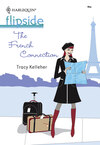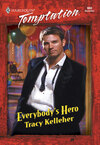Kitabı oku: «The French Connection», sayfa 3
3
ACTUALLY IT WAS MORE.
First came the chateau’s library, with hundreds of leather-bound volumes—a books-by-the-yard fantasy come true. Only these looked as if someone had used them for more than decoration.
Someone had.
“As a young boy, Edmond, the new count, spent many hours reading the works of Thucydides and Virgil—in the original Greek and Latin, of course,” Isabelle explained with a sweep of the hand.
“Was Mademoiselle Bruce his tutor, as well?” Shelley asked somewhat distractedly. She had just noticed what appeared to be a Gutenberg bible.
“Oh, no, Mademoiselle Bruce had already returned to her native Glasgow. Edmond mastered Greek on his own when he was recuperating from a fall from the oak tree behind the stables. He was pretending to be Rinaldo from Gerusalemme, off to fight the Saracens. You know the poem by Tasso, of course?”
Shelley shook her head. “I know of it, that’s all.” How many people could claim intimate knowledge of the epic Renaissance poem?
“Not to worry. Edmond can introduce it to you.” Isabelle smiled in that knowing way that immediately made Shelley suspicious. “Here, this way is to the Botticelli.” She pointed to the door on the opposite side of the room.
They glided along the marble floors into a large room with flaking, pale-green plaster walls. Fading Belgian tapestries depicting beheadings lined one wall, and atop a massive rococo sideboard sat a pair of matching Ming vases. Shelley bypassed those in favor of the art on the facing wall. There was a small panel painting of St. George, which to her trained eye appeared to be a Duccio. Next to it and practically hidden by heavy velvet curtains hung a delicately carved ivory. She turned to Isabelle. “Is it northern French? Fourteenth century perhaps?”
Isabelle squinted. “I had forgotten about that objet. It is so small, no?”
Small, yes, but definitely to die for. Roughly two inches by six inches, it depicted a pair of lions, male and female, cavorting in a forest under the watchful eye of exotic birds and small rodentlike creatures.
“But it’s so delightful, and a shame that it’s not better displayed.” Shelley loved the ivory—immediately. More than loved it. She lusted after it with greater intensity than she’d ever lusted for anything, Paul included. Which, come to think of it, probably said something about their sex life. True, he’s hung like a Clydesdale, but he has the finesse of one, too, Shelley had once confided to Abigail after too many Cosmopolitans.
“But surely you agree that the ivory cannot compare with our Botticelli?” Isabelle stepped next to what was clearly the family’s pride and joy.
Shelley approached the large framed drawing. It was a preliminary study for the painter’s famous Birth of Venus, in which the naked goddess of love rises from a scallop shell, her blond locks cascading over one shoulder. The thing of it was, the Italian Renaissance master had never been one of Shelley’s favorites—she always thought his women looked like Valley Girls without the benefit of blow-dryers. And now she was even more disappointed than usual upon viewing his work up close.
“I’ve never seen an original drawing of his,” she said, searching for a remark that would not offend her hostess. “And it’s amazing that you’ve managed to retain possession of these treasures after all these years.”
“Oh, they are not ours to possess really.” Isabelle looked genuinely shocked by Shelley’s comment. “We—the family, that is—think of ourselves more as caretakers of these things. It is our obligation to preserve them for the generations to come.”
Shelley nodded. She was beginning to understand how the aunts could live a life of genteel poverty and still be surrounded by priceless masterpieces.
The sound of a decisive tapping grew louder as footsteps approached. Shelley gladly turned her attention away from the art and the pressure of good manners.
“I managed to get Edmond on his mobile,” Marie-Jeanne announced. “He is rather busy right now, but he said he would be free for supper. You will stay and join us, no?”
“Of course she will stay. In the meantime, we can show her more of the chateau, the other rooms, especially Edmond’s room as a boy. And we can tell her more about Edmond.” Isabelle beamed and clapped her hands. The oversize moonstone ring nearly spun around.
Shelley was jet-lagged but she wasn’t brain-dead. She recognized a matchmaker caught in the thrill of the chase when she saw one. “I would be delighted to meet the count over supper. But until then I wouldn’t dare impose on your hospitality. I think it would be better to come back later when I am refreshed.” And when she didn’t have to listen to hours of stories about a card-carrying member of Mensa who was totally devoted to oral hygiene. A saga of mind over molars.
“If that is what you prefer, we would be happy to oblige,” Marie-Jeanne replied. “After all, we have much to discuss this evening, including the matter of the washing machine.”
“The washing machine?” Just when Shelley thought she had a grip on the old ladies, they hit her with another zinger.
Isabelle held up her hand in a rare display of authority. “The washing machine can wait. The girl is obviously tired. She needs to rest to be able to enjoy the meal.” A twinkle appeared in her eye. “I know—rather than have the tart for tea, I will serve the mûres to finish the supper. They are ripe and juicy, bursting with sensual pleasure.” She formed a circle with her thumb and forefinger and kissed her fingertips with her lips. Her eyes narrowed. Her carefully plucked eyebrows rose provocatively.
And somehow Shelley didn’t think Isabelle was reciting a lesson from Mademoiselle Bruce.
“DU CAFÉ?”
Shelley opened her eyes and blinked through the intense sunlight at the waiter. “Merci.”
He lowered the tiny cup of coffee to her table.
Two small sugar cubes nestled on the saucer. She unfolded the paper covers—as intricate as origami figures—and plopped the lumps in the minuscule amount of coffee. Then she used the itty-bitty spoon to stir. It was like a child’s tea set, Shelley thought. And everyone around her was doing the exact same thing—in addition to smoking nonstop. Not to mention the women, who were uniformly wearing high-heeled sandals that miraculously did not hamper their ability to maneuver on cobblestones. Unhealthy but coordinated people, these French.
Shelley lifted her coffee cup. Against the protests of Marie-Jeanne and Isabelle, she had insisted on leaving, not to take a rest at her hotel but to drive to nearby Marseilles. More specifically, Chateau d’If.
Shelley couldn’t help it. She had seen the schlocky film version of The Count of Monte Cristo with Richard Chamberlain at an impressionable time in her life—one of her older sisters had just described in gory detail what it was like to get your period. And memories of the TV and movie star—god bless his wooden performance—had seen her through many a sleepless night. How could she not visit Chateau d’If?
The sixteenth-century castle, one-time prison, was perched on a rocky island at the entrance to Marseilles’s harbor, and it had inspired Alexandre Dumas’s tale of vengeance and betrayal, wrapped up in a happy ending. Ah, the happy ending.
Shelley took another sip, finishing her coffee, and let the sugary remnants from the bottom of the cup slide down her throat. She closed her eyes. The stress of her current situation might be far from gone, but now, surrounded by blue skies and white cliffs—and under the influence of a sleep-deprived caffeine/sugar buzz—she could almost contemplate achieving her own happy ending. Even if it meant the IRS slapping on the cuffs and locking her up in one of the cells here on the island. Well, at least the view was better than at Attica Prison, not to mention the gift shop.
“Be positive,” Shelley murmured to herself. “There is no reason why life can’t imitate art.” Though frankly, she could do without the vengeance and betrayal part.
She leaned back and could practically feel the freckles popping out on her nose. No matter. She eased off her shoes and let the little bones in her toes relax on the warm stones. And here in the land of little cups and little demitasse spoons and little toes, Shelley allowed herself to stop being practical and to stop doing things such as obsessively recalculating her checking account balance. No matter what she did, anyway, it always came out to three hundred fourteen dollars and sixty-two cents.
Instead she let the golden Mediterranean light wreak havoc with the elasticity of her epidermis. Like some silly sixties movie starring Sandra Dee as the American ingenue, she gave in to the romance of southern France and daydreamed foolish thoughts of happy endings and finding a hero with a big H. Only there was no way she was transforming herself into some perky Sandra Dee redux, thank you.
“Miss McCleery?”
She smiled wider. Conjuring up a deep male voice with a French accent was a particularly nice touch to her daydream. The sensual sound embossed her colorful images.
“Miss McCleery?”
The voice became more insistent.
Shelley wrinkled her nose. It wasn’t good when a daydream ran away with itself. She concentrated on retaining the mood. The heat. The languor. The big, oversize hero.
Then she felt a light squeeze to her upper arm through her sleeve. Her eyes flashed open.
This was definitely not part of her dream.
Or maybe it was. A big, oversize hero appeared before her, his darkened figure outlined against the radiant blue sky.
She rubbed her eyes. A man. No question about it. Definitely a man. A man in what appeared to be a white, open-neck shirt, its sleeves pressed by the light sea breeze against his muscled forearms. He wore black trousers cut to perfection over his narrow hips and long, powerful legs. And as he arched his broad shoulders back upon returning to his ramrod-straight posture, she immediately thought of Marie-Jeanne.
Well, actually, she thought of Marie-Jeanne for no more than a nanosecond—posture was only posture, and he was a man, after all. “Quel homme!” What a man! as the teenager had exclaimed in her seventh-grade French textbook.
“Miss McCleery?” He turned his head at an angle, and Shelley caught the sparkle of even, white teeth.
She shaded her eyes from the sun and stared. If ever there was an excuse to ogle, this was it. “Oui, yes.”
“You were interested in the count?”
She lifted her chin, and with a slight smile that spoke of feminine wiles that appeared to have blossomed in the warmth of the French air, she replied, “Yes, I’m interested in the count.”
He lowered his chin. And slowly arched one eyebrow. “Then here I am.”
Shelley almost laughed. “Edmond Dantès, the Count of Monte Cristo?”
The corner of his mouth tilted up. His teeth glistened again. “No, Edmond, the Count de Montfort.”
4
TO SAY HER MOUTH HUNG OPEN wide enough to accommodate a small family of yaks was being understated. If the itty-bitty round table that held her teeny-tiny coffee cup were not blocking a direct path to the ground, Shelley would have been scraping her back molars off the dusty white pebbles at that very moment.
She rose, stumbling slightly as she pushed back her folding chair. “Count de Montfort.” Her voice sounded reedy, thin.
“Please, don’t get up.” He lightly touched her forearm with his hand—a hand far larger and stronger than Shelley would have imagined for the leisurely life of a European noble. “May I join you?”
She stopped teetering only to become aware that she was barefoot. She motioned for him to sit, and he let go, leaving a warm imprint through the thin material of her suit jacket. Forcing herself not to touch it, Shelley lowered herself in her chair. She blindly fished around for her shoes and nervously watched as he pulled out a chair for himself.
What wasn’t to watch? His jet-black, slightly disheveled hair curled over the white collar of his shirt. His shirt collar was unbuttoned—no, the button was missing. Nothing else was, though. Dark stubble highlighted his angular jaw and sculpted his too-prominent cheekbones. And then there were his eyes.
“You have blue eyes.” She couldn’t help it. Now that he was no longer directly in the sun, the color of his cornflower-blue irises was clear. Shockingly clear. Sherwin-Williams couldn’t have manufactured a more startling color.
He raised his eyebrows, providing dramatic arches over the twin azure pools. “Yes, it’s rare, but it is a trait that runs in my family, particularly among the men—and not always the upstanding ones, I’m afraid.” His English was flawless, his subtle accent as melt-in-your-mouth smooth as a whole bag of M&M’s. And as for his self-deferential tone—gosh, it was beguiling in a way that could get a gal in a whole lot of trouble. He might just as well have had a sign hanging around his neck that read Danger. Proceed At Your Own Risk.
No doubt the vast majority of the female population—those with a heartbeat and a passing knowledge of birth control—would have proceeded without a care, let alone major medical insurance.
Shelley, on the other hand, silently repeated her paltry checking account balance over and over as a way to keep herself grounded.
Seemingly oblivious to Shelley’s discomfort, the count turned his head in the direction of the waiter and instantly got his attention. “Café.” He looked back at Shelley and pointed to her empty cup. “Another?” He smiled.
And at that moment Shelley forgot her bank balance, her ATM access number and the name of her bank. She shook her head no, not trusting herself to speak lest she blurt out something equally embarrassing along the lines of, “I want to have your first-born child and strip you naked—preferably in reverse order.”
So rather than risk mortifying herself even further, Shelley concentrated on putting her shoes back on. She located one, but the other seemed to have gone AWOL. She poked around discreetly.
The waiter scurried off and Edmond studied Shelley. “So, Dream Villas has decided to make the rather grand gesture of sending over a personal representative to pay condolences?” He peered around the edge of the table. “I believe that’s my foot and not your shoe that you’ve located.”
“Oh, I’m sorry.” Shelley immediately drew back her foot. “If you’ll just give me a second. My feet were swollen after the flight, so I took my shoes off to be more comfortable. But now one of the little suckers has decided to make a break for it—kind of appropriate here, don’t you think? Seeing as we’re sitting in front of a former jail. Jailbreak? Get it?” She stopped. “I’m rambling, I know.” And decided the best course of action was to lift up the tablecloth and bend down to find the errant flat.
And maybe stay there. Until the next millennium at the very least.
After a long moment, the count leaned down. “I was starting to wonder if I should send for a rescue party.”
Shelley looked up and saw his bemused grin peeking from under the edge of the cloth. She straightened up—and proceeded to hit the back of her head on the underside of the table. Overhead, the cups rattled.
She pulled back and came to an upright position, rubbing the back of her head but stopping as soon as she saw him reemerge from below.
“Your shoe?”
“My shoe?” She saw her slide in his hand and remembered what she had been doing in the first place. “Oh, right, my shoe. Thank you.” As she leaned to retrieve it, a lock of her perennially unruly hair loosened from the barrette, which was meant to hold the thick mass of curls in an efficient twist, and it tumbled forward.
And that was enough.
That singular, insouciant flounce of dark red hair had Edmond suddenly reevaluating his first opinion of Shelley McCleery as a bland if somewhat clumsy American. Not that he had a negative image of Americans in general, mind you. Far from it.
Some of Edmond’s fondest memories dated back to his time as a seventeen-year-old exchange student in Grantham, New Jersey, where he had enjoyed those quintessentially New World contributions to civilization—lacrosse, The Simpsons and Philly cheesesteaks. Ah, what bliss! Not only that, CDs were cheap by European standards, and female classmates were seemingly all above average in terms of brain-power and the length of their well-proportioned legs.
It must have been all that lacrosse.
Even more miraculous, a French accent allowed an otherwise shy bookworm, one who constantly fretted that he had yet to experience a growth spurt, to get more than the proverbial foot in the door.
Ah, what bliss!
Until the end of June, that is. That was when he’d gotten word that his grandfather had died on the eighteenth green of St. Andrew’s Royal and Ancient. Since he had yet to putt in—with the distinct possibility of making a birdie—Edmond knew Grand-père must have felt cheated.
Edmond had felt cheated, as well. Gone was the possibility of lifeguarding at the Jersey shore that summer. Back he came to study for the baccalauréat, prep for the entrance exam to one of the elite grandes écoles and ultimately a career in government. Such was the decree by Grand-père’s widow, the last of his many couturier-clad and nipped-and-tucked wives. “It was your grandfather’s last wish,” Françoise had declared melodramatically over her third glass of sherry and just before she’d patted his bum when he’d been leaving the study. “He wanted you to preserve the family’s long tradition of service to the country.”
Frankly, Edmond figured his grandfather’s last wish would have been that he’d go two under par for a full round of golf. Edmond also didn’t cotton to being goosed by his stepgrandmother, whose face was so tight she could barely blink.
But in his own way Edmond did feel an obligation to the family legacy, a legacy—mind you, that included as many scoundrels and ne’er-do-wells as diplomats and statesmen. Given this latitude, he figured he was perfectly justified in fulfilling his calling in his own particular way—no excuses necessary, thank you.
Yet as Edmond held on to Shelley McCleery’s slim Italian shoe—very fine quality, he noticed—he was struck by how much he really didn’t want to think about his calling. Not when the shoe belonged to a slender, finely shaped foot which in turn was attached to a well-turned ankle—that being as much of her leg as he could glimpse beneath the table and below the hem of her trousers. And having never given much thought to having a shoe, foot or, for that matter, ankle fetish, the arousing images going through his mind were…well, really quite arousing.
He shifted in his chair.
“I’ll take my shoe then,” she prompted, holding out her hand. “It’s one of my favorites, not to mention that I got it for a great price at Nordstrom’s in Woodbridge, New Jersey, which, if you’re ever in the States, I highly recommend checking out—not that you need to worry about that kind of thing.”
Edmond raised a skeptical eyebrow. “You’d be surprised.”
“In any case, ever since I discovered that my ability to hop on one foot for a prolonged distance was not up to Olympic standards, roughly about the same time I realized I would never be a prima ballerina, rock star or winner of the Pillsbury Bake-Off contest—I was still holding out for secretary of state, mind you—I became quite fond of wearing shoes on both feet.”
Edmond hesitated before speaking and looked once more beyond the severe pantsuit and the prim hairstyle to the winking green eyes—rather startling emerald-green, he realized—and saw there was something quite unique about Shelley McCleery beyond the fact that she had mentioned New Jersey, the sybaritic utopia of his adolescence.
“My shoe?” A note of impatience tinged her question.
He coughed. “Of course. Allow me.” And on the hard pebbles of the café’s courtyard and in the ominous shadow of one of southern France’s most imposing prisons, he knelt down on one knee and extended Shelley’s shoe toward her.
She looked furtively around, relieved to find that the proprietor, who was leaning against the sun-drenched stucco wall of his establishment, was totally intent on deciphering the daily racing form.
“I feel quite silly, you know,” she said and reluctantly raised her naked foot.
“You think you feel silly? Imagine how I feel?”
“Then why do it?”
He gave her a lopsided smile, and she noticed the button on the cuff of his sleeve was about ready to fall off.
“Why do it?” he repeated her question as he thought. “Because this may be my one and only chance to play Prince Charming.” He reached for her foot with his free hand and, as he held the back of her ankle, slid on her shoe.
His head was bent, and she couldn’t see his face, only his wavy black hair falling this way and that. It really was too long and desperately needed to be cut, or barring that, combed. She could think of any number of women ready to take on the task. “Actually, in your case it’s Count Charming,” she joked.
But then stopped.
Because his fingers were caressing the sensitive skin at the back of her heel. Should she say something, extricate her foot in some way? Did she really want to?
A noisy seagull chose that moment to swoop over and land on the ground in front of the café. It walked in its stiff-legged gait and poked among the stray sugar wrappers and baguette crumbs that had blown to the ground. From its purposeful stride, it was clear the bird was familiar with this exercise. It stopped a few feet from the table and stared at Shelley with its black, button-shaped eyes.
And just like that the moment was broken. Edmond let go of Shelley’s foot and settled himself back in his chair.
She tucked her legs under the table.
He coughed into his hand.
She became entranced by the sea.
“Another coffee?” he asked.
She brought her gaze back to him. “No. No, thank you. I think I need to moderate my mix of uppers and downers if I’m going to stay awake this evening.” She rubbed her finger on the Teflon-coated tablecloth, with its flower-print pattern. “Not to change the subject too abruptly, but I wanted to tell you how sad I was to hear of the death of your grandmother, Madame la Comtesse.”
“That’s very kind.” A note of formality descended over the conversation. “In point of fact, she wasn’t my actual grandmother since she was my grandfather’s third wife. My real grandmother, along with my parents, died while strolling along the Promenade des Anglais in Nice many years ago when I was quite young. A Milanese banker, distraught at his mistress leaving him for the center-forward of the Forza Napoli soccer team, lost control of his Lamborghini, which jumped the sidewalk and struck them.”
“How—” melodramatic seemed too insensitive “—tragic.” There were worse things after all than having a father run off to the circus.
“Yes, well, they had just finished having aperitifs at the Hôtel Negresco, so I think they were feeling no pain.” The way he worked his jaw belied the flippancy of his remark.
“At least you had your grandfather.” Who later also died on him, Shelley realized. The layers of tragedy were beginning to rival Les Misérables.
Edmond signaled to the waiter and pointed one finger toward his empty cup. The man reluctantly put down his racing form and went inside to make another espresso. “Yes, I was very lucky. And then there were my aunts, of course.”
“Yes, Marie-Jeanne and Isabelle are clearly totally enamored of you.” Shelley saw him frown. “What? Have I said something inappropriate? I mean, I hope you don’t think I was forward calling your aunts by their first names. Isabelle insisted, you see.”
Edmond paused as the waiter delivered his new espresso, taking away the old cup but leaving the bill. “No, it’s not that. It’s that most people cannot tell my aunts apart. True, there are two years between them in age—Marie-Jeanne being the older at seventy-three, not that she would ever admit that—but they look practically like jumelles, twins.”
Shelley nodded. “Yes, but Isabelle’s eyes are slightly wider apart and Marie-Jeanne has a small mole near her right ear.”
Edmond leaned back in his chair and scrutinized her carefully. “Remarkable.”
“Actually not that remarkable. It’s just a matter of training. I once studied to be an art historian, so it’s just that I notice details better than most people.”
He continued to stare at her as he lifted his cup and drank.
Shelley gulped and turned to the water. She wasn’t used to people intensely gazing in her direction. Even Paul had never gazed on her with such interest—the televised coverage of the NCAA basketball championship maybe, but never her.
Naturally, she did the only thing a gal unused to rapt attention plus lacking a discreet application of Clinique light-as-a-feather but full-covering foundation could do—she turned a deep pink hue akin to a floribunda rose.
“You’re blushing,” Edmond observed.
“It must be the sun.” Shelley diverted her gaze toward the dock. “Is that the ferry I hear?”
He turned in the direction of the small quay at the bottom of the stone stairway, then glanced at his watch. “Even arriving reasonably on time.” He finished his coffee in one gulp.
“Actually I think this is the boat that was due an hour and twenty minutes ago.” She slipped the small piece of paper with the bill from under her cup and fumbled for her bag and her change purse.
He reached out. “Allow me.”
She clutched her beaded purse decorated with the face of Betty Boop. It was at moments like these—alien, foreign moments with a sexy, foreign nobleman—that Shelley could use some Boop-Oop-A-Doop. “Monsieur le Comte—”
“Please call me Edmond. Whenever someone uses the title, I have this feeling that I am being asked to meet their very eligible daughter.”
On his comment alone she had no qualms handing over the check. Besides, it came to under the equivalent of two dollars, so it wasn’t as if she owed him any favors like a quickie in one of the corner cells. Hmm, a quickie in one of the corner cells…
Shelley cleared her throat and replied, “I’m sure you suffer through the indignities of matchmaking as nobly as possible.” She mentally thanked Betty Boop for her outburst of Dutch courage and slipped the change purse back in her Miu Miu bag—a hand-me-down from Abigail, who had moved on to a monogamous purchasing relationship with Bottega Veneta ever since her promotion to partner.
“Are you trying to make fun of me?” Edmond asked, his voice aghast.
Shelley shrugged. “Only because you invite it.”
Edmond pursed his lips and shrugged his shoulders—something he did very well being French and jaded, not to mention having very broad yet flexible shoulders. “You’re right. Anyway, I shouldn’t complain about the cream of female aristocracy throwing themselves at me. Luckily my aunts tend to fend off the worst of them. They have this inflated view of my worth—” if only they knew, Edmond thought “—and deem most prospects beneath me.”
“Funny, I got the impression it was the exact opposite.” Shelley had visions of Isabelle plying eligible women from Aachen to Zermatt with all sorts of baked goods. “I’d say their matchmaking skills are pretty well honed.”
Edmond blinked slowly. Yet another surprise from Ms. McCleery. “You’re saying…that my aunts suggested that you…I?” He made a circle with his hand.
Shelley held up a hand in turn. “Not to worry, your virtue is safe with me.” Her virtue after a few more of his self-deprecating grimaces was another matter completely.
He leaned forward. “Perhaps this is something we should discuss further—on the boat ride back to Marseilles.” He emptied a pocket of some change—retrieving a canceled Paris métro ticket that had tumbled out at the same time—and left the euros on the table. Shelley noticed he was a generous tipper.
She also noticed that even within the range of a friendly harborside chat, she was rapidly moving out of her league. She might have envisioned a romantic interlude with some archetypal charming count, during which time she pictured them both skipping joyously and seemingly weightlessly through the misty dawn—she clothed in a diaphanous dress of Grecian folds, her hair flowing about her shoulders and never in her nose or mouth, he in a white pirate shirt open to reveal a manly chest with a discreet amount of chest hair…
But maybe not quite yet. Not when jet lag coupled with fear was the principal force consuming her body.
Instead she assumed a businesslike demeanor, one that fit the practical side of her nature all too well. “Actually I’d prefer to discuss the matter of the Dream Villas contract—at dinner back at the chateau this evening. Your aunts have arranged it, and I know that Isabelle is quite emphatic that I taste her fruit tart.” The less said about the implied aphrodisiac qualities, the better.
Edmond raised one eyebrow thoughtfully and appeared to consider her statement for a moment. “All right. Dinner at the chateau it is. In which case, I’ll drive you back to Aix after the ferry lands in Marseilles.”
Shelley rose, making sure that she had her shoes before she did so. “That won’t be necessary. I’ve got a car.” She walked across the stones in the direction of the ferry landing.
He pushed back his chair, its feet scraping on the stones. “You drove? In Marseilles?” he asked, quickly following in her heels. And very nice heels they were.
Shelley stopped, only to find Edmond looming over her one step higher on the descending stairway. A more defensive posture she didn’t need.
She continued the descent to the sea—not a metaphor for the current state of affairs, she assured herself without much conviction. “Forget the driving. I found the parking to be the real challenge. Fortunately, I found this underground garage by the Vieux Port—” She turned when she reached the mooring and saw him hesitate at the bottom step. “What?” she asked. “Did I do something wrong about parking there? Isn’t it safe?”
Ücretsiz ön izlemeyi tamamladınız.

















